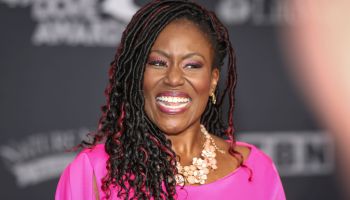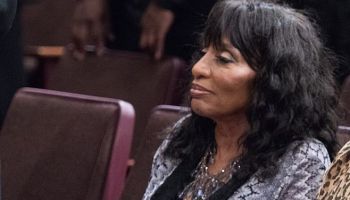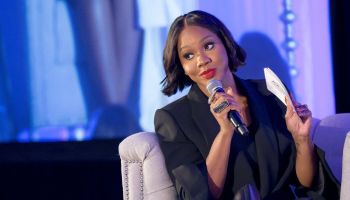By Allison Matthews, MA (@Starr_Dreamer)
UNC-Chapel Hill Doctoral Candidate
Article Reposted Via: FuriousAndBrave.Com
I recently ended a romantic relationship. After several months of dating, I realized I no longer wanted to be in the relationship. There was nothing really wrong with the guy, but for me, the spark was missing. I found myself searching for it, trying to make it happen, holding on for dear life because of this seemingly ubiquitous message that I should stay with the man with 90% of what I want, rather than constantly hoping for the mysterious 10%. He definitely had a lot of great attributes: he was incredibly sweet, thoughtful, religious, family-oriented, ambitious, funny, and intelligent. BUT there was just something missing…that x-factor.
Part of the reason I was afraid to let him go was because of popular media outlets that tell Black women to “appreciate the ‘good Black man,’” stop taking him for granted, and never let him go if you find him. For example, Steve Harvey’s book, Think Like a Man, is just one of many examples of how popular culture fixates on the pathologies of Black female singlehood, telling women to change their behavior to attract men. Women are told to work to keep the “good” man regardless of whether that man offers them what they want or not. This message releases men from the burden of altering their behavior, which is treated as static. Men just are. Women have to accommodate them. Additionally, this book and other TV shows, blogs, social networks, etc. send the message that “good black men” are valuable because being female and single is not valuable.
Academic scholarship seems to tell a similar story—it is not ok to be single and female; therefore, women should work hard to attract “eligible” mates. Estimates of the Black female to male ratio of “eligible” mates range from 2:1 to 16:1. These estimates are somewhat confusing because the definition of “eligible” is variable and arbitrary. The definition of “eligible” includes many middle class characteristics, such as having high education attainment and income and no record of incarceration. This definition essentially deems huge chunks of the population as un-datable based on demographic characteristics alone. Very rarely do these studies include an analysis of why there is a sex ratio imbalance in the first place. If we look at the sex ratio between Black men and women—the total number of unmarried Black men and women 0-28 years old—there is no imbalance. However, as we age, Black men begin to severely reduce in numbers. The impact of poor educational resources, racial residential segregation, neighborhood violence, high unemployment, heavy police surveillance and racial profiling, and the criminalization of Black bodies all have a significant influence on the reduction of “eligible” Black male partners. Scholars should take into consideration other factors that make people “eligible” for dating. Many women choose to date and/or marry men with less income, education, and an incarceration record—not because they are settling, but because they choose to look beyond what society says is an “eligible” mate to get to know the person. Above all, most women want a partner who is nice, caring, open-minded, honest, reliable, and a good human being. Additionally, singlehood can be just as desirable an end for women. Women have the right to agency and self-determination in all domains of their lives, from career choices and reproductive health to relationships.
Single womanhood is devalued across all races, not just in Black communities. Women in high status careers are thought to be less desirable to “eligible” men because of stereotypes that portray them as 1) too smart, 2) elitist, 3) intimidating, and 4) too career-oriented. Too often, I have heard professors and graduate students say it is better for women to wait to have children until after they get tenure. Some professors have even set unrealistic expectations of productivity such that if an academic has any sort of social life, they are seen as lazy and unfocused. But there are plenty of women who defy these stereotypes and challenge the social norms of academia. Many have successful marriages and children, and enjoy great careers. I am grateful for my mentors and female colleagues are willing to speak out against these stereotypes and unrealistic expectations. Additionally, there has been research showing that the majority of Black educated women do get married and have children, albeit in their mid-thirties as opposed to their mid- to late-twenties. Demetria Lucas, a writer for the Root.com, rightly criticizes those who tell Black women to stop pursuing higher education to get married. She mentions several studies showing that educated women are less likely to get divorced and are more satisfied in their marriages than less-educated women. Ultimately, there is nothing wrong with waiting and choosing to be single in the meantime. I refuse to allow the fear and anxiety incited by popular media and statistics control my decisions, relationships, or happiness.
In the end, I choose my happiness over staying with a man just because I am afraid I will not find another ‘good Black man,’ or any man of any race. I know it is not fair to him or me to stay in a relationship where I don’t want to give my all. Why should any woman settle for what society tells her is a quality mate rather than finding what she truly wants? Each woman should reflect on what makes her happy and define for herself what she wants in an “eligible” mate. No one should ever fear being single because happiness is something that should be cherished and protected.
About Allison Matthews
Allison Mathews is a doctoral candidate in the Department of Sociology and Humphreys Fellow with the Graduate School at UNC-Chapel Hill. Allison is from Dallas, TX and earned her MA in Sociology from UNC-Chapel Hill and her BA in Sociology from Howard University.















